Book contents
- Frontmatter
- Dedication
- Epigraph
- Contents
- Foreword
- Acknowledgements
- Map
- Themes
- 1 History: how things came to be this way
- 2 Prescriptivism and other useless pastimes
- 3 Language change: observing and accepting it
- 4 What is happening to words?
- 5 Languages and dialects in contact and conflict
- 6 Respecting English grammar
- 7 Respecting ordinary language
- 8 Sounds and fury
- 9 Respecting local speech
- 10 Grammar: the wonder of it all
- 11 More about words
- 12 Origins
- 13 Accent rules
- 14 Respecting names
- Postscript
- Index
3 - Language change: observing and accepting it
Published online by Cambridge University Press: 05 August 2016
- Frontmatter
- Dedication
- Epigraph
- Contents
- Foreword
- Acknowledgements
- Map
- Themes
- 1 History: how things came to be this way
- 2 Prescriptivism and other useless pastimes
- 3 Language change: observing and accepting it
- 4 What is happening to words?
- 5 Languages and dialects in contact and conflict
- 6 Respecting English grammar
- 7 Respecting ordinary language
- 8 Sounds and fury
- 9 Respecting local speech
- 10 Grammar: the wonder of it all
- 11 More about words
- 12 Origins
- 13 Accent rules
- 14 Respecting names
- Postscript
- Index
Summary
Changes in language – in pronunciation, grammar and word-meaning – are inevitable and unstoppable. They are also a little mysterious. All languages change through time, but it is not easy to say why. It seems simply to be a built-in characteristic of human languages that they change. This is fascinating, but it can also be disturbing. This section of the book is devoted to arguing that we should prefer to be fascinated by linguistic change rather than be disturbed by it.
Fing and bruvver
Right now is a very exciting time to be doing research on the English language. All languages change: if you heard Shakespeare, you would find him hard to understand; and if we had recordings of Anglo-Saxon, you would not understand it at all. The sounds of English have changed enormously over time.
Why is this? We do not really know. It is just an inherent characteristic of human languages that they change. We do not fully understand how changes take place, either, so when we do have a chance to observe a change as it is happening, that is exciting. It is too late to observe how the change from Chaucer's “k-nicht” – his way of saying knight – to our “nite” happened; but here in England we can now very happily study, while it happens, a fascinating new change involving the two th sounds, as in thigh and thy. Older Norfolk people will have noticed that many younger people no longer have these sounds. They replace them with f and v, as in fing and bruvver.
When sounds fall together like this, it is technically called a merger. This particular merger is known as TH-fronting. It started in London around 1850 and had spread to Bristol by 1870. It was reported in Reading around 1950, Norwich in 1960, Hull 1970 and Glasgow 1980. There is a clear pattern of geographical spread: it has not arrived in Liverpool yet, but it probably will.
Some people are not as excited about TH-fronting as I am. They complain about it. They are part of the venerable Complaint Tradition which is repeated in every generation: older people hear youngsters speaking differently and object.
There is nothing wrong with TH-fronting, however. Nothing terrible comes of it.
Information
- Type
- Chapter
- Information
- Dialect MattersRespecting Vernacular Language, pp. 44 - 53Publisher: Cambridge University PressPrint publication year: 2016
